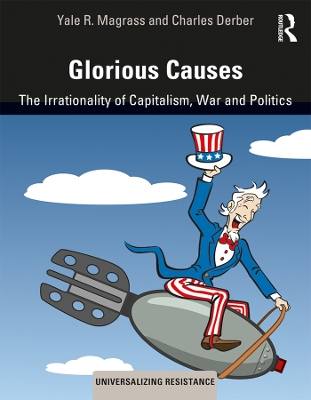Universalizing Resistance
5 total works
While security stories often point to real threats, the narratives of leaders are as much about legitimating the power of rulers and the political and economic system that brought them to power. Derber and Magrass offer a penetrating examination of this phenomenon across history and types of societies. Their analysis reveals the great irony about security stories: they historically increase insecurity, imperiling citizens and nation. In the US today, the contradiction is especially acute, as security stories told by Trump divide US citizens against one another.
The book builds from an analysis of the extreme dangers of the prevailing security stories to a new paradigm of true security. The authors develop new approaches as our best hope for avoiding catastrophe and creating a socially just society based on real security for a nation and for humans across the planet.
When the Women’s March gathered millions just one day after Trump’s inauguration, a new era of progressive action was born. Organizing on the far Right led to Trump’s election, bringing authoritarianism and the specter of neo-fascism, and intensifying corporate capitalism’s growing crises of inequality and injustices. Yet now we see a new universalizing resistance among progressive and left movements for truth, dignity, and a world based on democracy, equality, and sustainability.
Derber offers the first comprehensive guide to this new era and an original vision and strategy for movement success. He convincingly shows how only a new universalizing wave, a progressive and revolutionary "movement of movements," can counter the world-universalizing economic and cultural forces of intensifying corporate and far-right power.
Derber explores the crises and eroding legitimacy of the globalized capitalist system and the right wing movements that helped create the Trump era. He shows how left universalizing movements can--and must—converge to propel a mass base that can prevent societal, economic, or ecological collapse, stop a resurgent Right, and build a democratic social alternative. He describes tactics and strategies for thisnew progressive movement. Brief guest "interludes" by Medea Benjamin, Noam Chomsky, Ralph Nader, Bill Fletcher, Juliet Schor, Gar Alperovitz, Chuck Collins, Matt Nelson, Janet Wallace, and other prominent figures tell how to coalesce and universalize activism into a more powerful movement wave—at local, community, national, and international levels.
Vivid and highly accessible, this book is for activists, students, and all citizens concerned about the erosion of justice and democracy. It thoroughly illuminates the rationale, theory, practice, humanism, love, and joy of the social transformation that we urgently need.
Chomsky for Activists
by Noam Chomsky, Charles Derber, Suren Moodliar, and Paul Shannon
Those who regard him as a "doom and gloom" critic will find an unexpected Chomsky in these pages. Here the world-renowned author speaks for the first time in depth about his career in activism, and his views and tactics.
Chomsky offers new and intimate details about his life-long experience as an activist, revealing him as a critic with deep convictions and many surprising insights about movement strategies. The book points to new directions for activists today, including how the crises of the Coronavirus and the economic meltdown are exploding in the critical 2020 US presidential election year. Readers will find hope and new pathways toward a sustainable, democratic world.
Drawing on historical cases of the American South before and after the Civil War, Europe – especially Germany – between the world wars, and the United States in Vietnam and its aftermath, this book takes a historical approach to explain the problems of capitalism and democratic leadership in western democracies today.
Capitalist democracies proclaim equality, material prosperity and comfort but produce extreme differences in wealth and power. They promise security and peace, but deliver frequent wars. The promises broken, elites often turn to other visions- partially borrowed from feudalism- to win public support. Nations turn to honor, nobility and war as a way of winning over workers and legitimating the capitalist system itself.
Capitalism’s contradictions often have produced a cultural divide. One side, "cosmopolitans" – urban, see themselves as citizens of the world, not one region or country – identify as secular, preach multi-culturalism, entertain state welfare systems, and are cautious about going to war. Their opponents, "traditionalists," breed among people who feel left behind, anxiousness and insecurity, often embracing community, tradition, God and family.
The devastation of the world wars and the Third Reich led Europe to forgo visions of empire, militarism and glory and focus upon improving the quality of life for their own citizens. Although the United States does not need to experience comparable trauma, they should follow Europe’s example- forget glory and instead build a better life for the American people. The last chapter will consider how such a change could emerge in the US and who might help fight for it.
This is an original, accessible book for scholars, students, activists, and the general public on the greatest crisis the world has faced. The authors challenge the widespread notion that a green and peaceful set of technological reforms in the current economic and political system – perhaps a “green capitalism” – can prevent disaster. Dying for Capitalism analyzes the “triangle of extinction” that links capitalism, environmental destruction, and militarism as a system that cannot sustain life on the planet. The authors analyze how the extinction triangle evolved historically, how it functions globally as integral to the world capitalist order, and how the United States has become the dominant “extinction nation.” They also show how recent anti-democratic and anti-scientific cultural and political forces intensify denial of the threat and subordinate health and survival to profit and extreme concentrated power.
The book offers a “slender path” of social and political transformation that can prevent catastrophe. The path requires moving beyond current ruling systems. But possibilities of survival arise from action at local, state, regional, and global levels through multiple strategies and movements that already exist. The authors draw on the history of abolitionism and emancipation from slavery in the United States to show how a system that appears unchangeable can be transformed, while describing organizations, movements, and practices that are models of hope and a shift from the triangle of extinction to the “circle of creation.”




